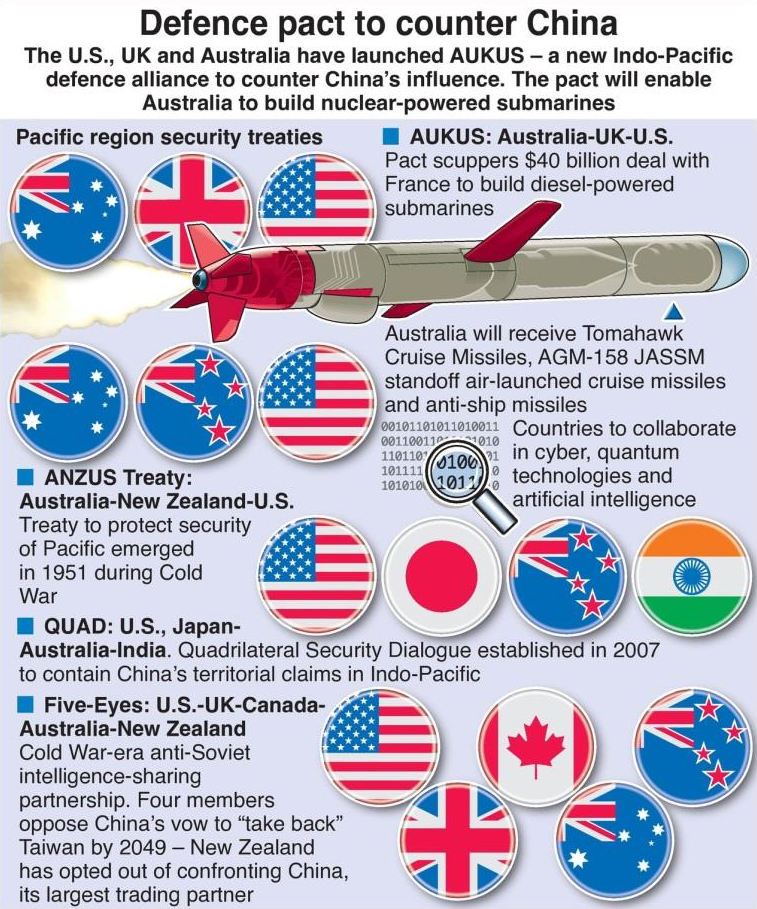International Relations
Nuclear Submarine Alliance: AUKUS
- 29 Dec 2021
- 6 min read
For Prelims: AUKUS, QUAD, NATO, South China Sea, Nuclear Submarines.
For Mains: AUKUS Alliance, its impact on Indo-Pacific and QUAD grouping, its implications for India.
Why in News
Recently, Australia, the US and the UK signed an agreement allowing the exchange of sensitive “naval nuclear propulsion information” between their nations.
- It is the first agreement on the technology to be publicly signed since the three countries announced the formation of a defence alliance, AUKUS, to confront strategic tensions in the Pacific where China-US rivalry is growing.
- Under the AUKUS deal, Australia would obtain eight state-of-the-art, nuclear-powered but conventionally armed submarines capable of stealthy, long-range missions.
AUKUS
- About:
- In September 2021, the US announced a new trilateral security partnership for the Indo-Pacific, between Australia, the UK and the US (AUKUS).
- The major highlight of this arrangement is the sharing of US nuclear submarine technology to Australia.
- Its Indo-pacific orientation makes it an alliance against China’s assertive actions in the South China Sea.
- It will involve a new architecture of meetings and engagements between the three countries, as well as cooperation across emerging technologies (applied AI, quantum technologies and undersea capabilities).
- Impact on Indo-Pacific Realm/QUAD:
- There is concern that AUKUS could leave a deep scar on US-EU relations and the North Atlantic Treaty Organisation (NATO), and weaken the international coalition in the Indo-Pacific.
- NATO was established by the North Atlantic Treaty (also called the Washington Treaty) of 4th April, 1949, by the United States, Canada, and several Western European nations to provide collective security against the Soviet Union.
- NATO's primary goals are the collective defence of its members and the maintenance of a democratic peace in the North Atlantic area.
- France had cancelled a scheduled meeting of the foreign ministers of Australia, France, and India at the UN.
- In the last couple of years, the trilateral has become an important element in the emerging Indo-Pacific architecture. But the cancellation of the meeting is a blow to the trilateral engagement.
- It is not clear whether the QUAD and AUKUS will reinforce each other or remain mutually exclusive.
- There are some beliefs that the “Anglosphere nations” — which share common cultural and historical ties to the UK — inspire more confidence in each other.
- QUAD is a grouping of India, USA, Australia and Japan which aims to safeguard the interests of democratic nations in the Indo-Pacific region and address global challenges.
- There is concern that AUKUS could leave a deep scar on US-EU relations and the North Atlantic Treaty Organisation (NATO), and weaken the international coalition in the Indo-Pacific.
- Implications for India:
- India has stated that the new partnership is neither relevant to the Quad, nor will it have any impact on its functioning.
- Despite indifference towards AUKUS, India may derive secondary benefits from the AUKUS arrangement having three advanced nations with arguably the most sophisticated military power in the world coming together to support a free and open Indo-Pacific in the light of the increasingly assertive attitude of China in the region. This could provide some degree of deterrence to China.
- Also, India’s concerns regarding ‘encirclement’ by China may be partially mitigated by AUKUS.
- China has made massive inroads in India’s neighbourhood in terms of infrastructure development projects and presence.
- There is apprehension, the deal may eventually lead to crowding of nuclear attack submarines (SSNs/submersible ship nuclear) in the Eastern Indian Ocean, eroding India’s regional pre-eminence.
Way Forward
- While the warming of the Indo-US relationship brings comfort to Indians, India should beware of hyperbole, obscuring reality, in the bilateral discourse.
- American offers of help “to make India a great power” and declarations that “two of the world’s great democracies should also have the world’s two greatest militaries,” must be taken with a generous pinch of salt.
- We need all the technologies being offered to Australia, in addition to “know-how” and “know-why” of much else, including stealth fighters, jet engines, advanced radars and nuclear propulsion for submarines as well as aircraft-carriers.
- As India discovers that every European nation, from tiny Luxembourg to a rising Poland, has something to offer, Europe has become a thriving hub of India’s international relations.
- The last few years have seen an intensification of India’s strategic engagement with France. For example, the government has overcome the earlier reluctance in Delhi to work with France on Indian Ocean security.
- One is to remind France, Australia, the UK and US of the shared interests in securing the Indo-Pacific and the dangers of letting the current quarrel undermine that larger goal.







